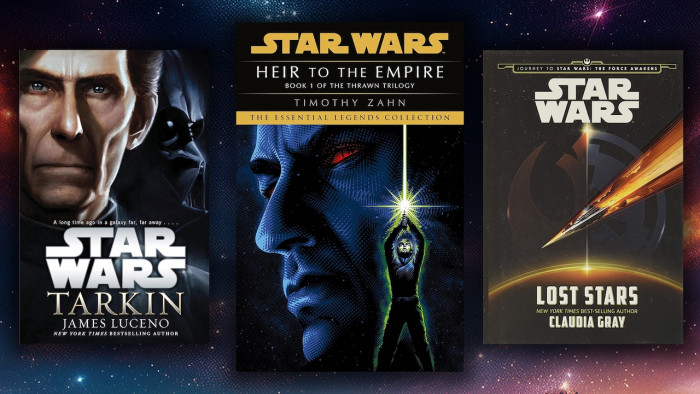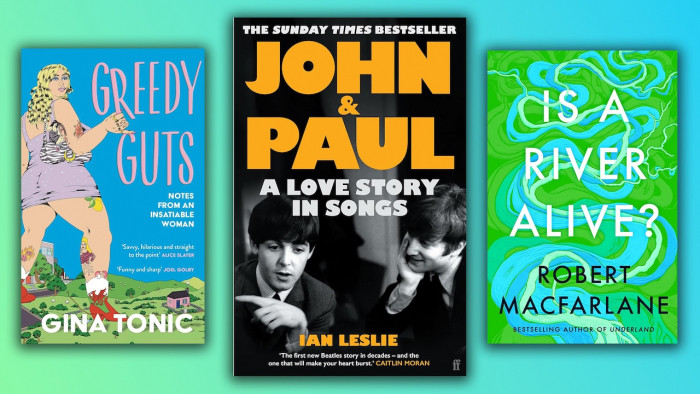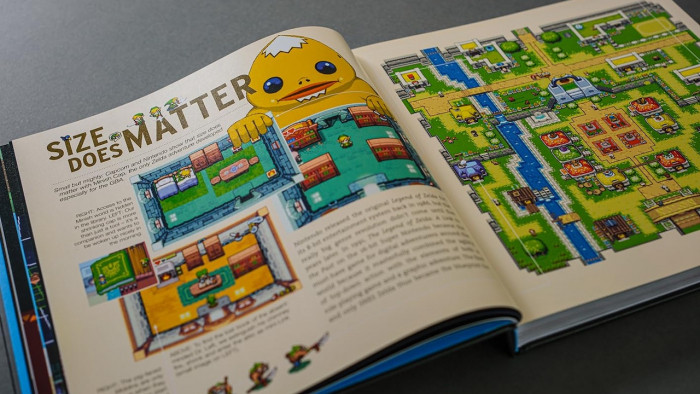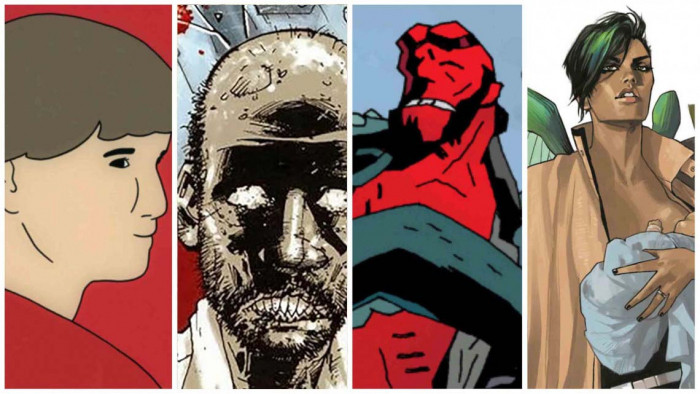10 Star Wars books everyone should read: Legends, Canon, and everything in between
The Force is strong in these...


With May 4th approaching, the time is right for us to look back and reflect on the best Star Wars books in the saga. While there’s a wealth to choose from, we’ve done our best to whittle the list down to a select ten.
Tricky, it was. Got a bad feeling that you will disagree with some of our choices, we do.
Honourable omissions include Michael A Stackpole’s X-Wing trilogy, Drew Karpyshyn’s Dark Bane novels, Claudia Gray’s Leia-centric Bloodlines, and the always readable Tales shorts (particularly Bounty Hunters). Regardless, here are the ten best stories from a galaxy far, far away…

10. The Rising Storm
(Cavan Scott)
The High Republic era has largely been a success from a storytelling perspective, resisting the urge to have it be simply ‘What Yoda was doing 300 years ago’ (although he does appear), and instead using it as an opportunity to reveal the Jedi in their heyday, and with it an all-new cast. As tempting as it was to have Charles Soule’s series opener Light Of The Jedi in this list, it’s Cavan Scott’s The Rising Storm that gets our nod.
Very much the Empire Strikes Back of the series, before this, you could have been forgiven for not fully buying the Nihil as a credible threat to the Jedi. That all changes here, bringing in a level of chaos that turns the series into essential reading for any Star Wars fan, all the while adding new layers to characters like Avar Kriss and Elzar Mann. If Light Of The Jedi piqued your interest, then The Rising Storm made the series a must-read.

9. From A Certain Point Of View: A New Hope
(Various)
As a hook, it’s certainly a strong one: 40 stories, each retelling a small part of the story of A New Hope, only coming from the perspective of someone else in the scene. The authors included here appear to have been given free rein, and indeed, the tone varies wildly from the more straightforward (Gary Whitta’s opener, ‘Raymus’, has the ill-fated Captain Antilles filling the narrative gap between the end of Rogue One and the beginning of A New Hope) to the downright bizarre (Nnedi Okorafor’s ‘The Baptist’ finally gives the trash-compactor monster both a voice and a name).
While it’s fascinating on its own basis to see events at first hand that are only mentioned or observed from afar in the films (Madeleine Roux’s ‘Eclipse’ has Breha Organa planetside during the destruction of Alderaan, and Kieron Gillen’s ‘The Trigger’ puts comics favourite Doctor Aphra in the wrong place at the wrong time as the Imperials follow Leia’s bogus lead to Dantooine), the real attraction of this volume is the selling of Star Wars’ strengths: with such a real and lived-in universe, showing a new perspective reveals yet more layers to the saga.

8. Dark Disciple
(Christie Golden)
While the premature decision to can the Clone Wars TV series meant we never saw this storyline on TV (as originally intended), Christie Golden’s treatment of it makes it very much more than the next best thing. After one Count Dooku atrocity too many, a desperate Jedi Council tasks maverick knight Quinlan Vos with assassinating the Sith Lord, who brings along Dooku’s former acolyte Asajj Ventress for the ride.
Both Vos and Ventress are fan-favourite characters, and seeing the impact they have on each other is fascinating – one struggles to shrug off the darkness he has been plunged into, while the other reacts with confusion to the newfound light. While we would have liked to see this play out on the screen, the novel format allows for much greater exploration of their dynamic, propelling the story along to a fiery conclusion. The recent return of Ventress and the unconfirmed status of Vos (brief Kenobi mention aside) undercut the ending of this a bit, which is a shame, but that’s hardly the book’s fault.

7. Traitor
(Matthew Stover)
The New Jedi Order series was as true a game-changer for Star Wars as it was possible to be. Introducing a formidable enemy in the form of the Yuuzhan Vong, a race of religious eco-fanatics who existed outside the Force, they underline their evil credentials by killing Chewbacca, before laying waste to all manner of classic Star Wars locations, most notably Coruscant.
Among a sea of worthy candidates, Traitor gets our pick for best book of the series. Focusing on the fate of Jacen Solo post-capture, his experiences with both his captors and the mysterious Vergere have ramifications for not just the war, and our understanding of the Force, but the direction of the books in general. Star Wars has always been more like cowboys in space than anything else, but this is the most truly science fiction it has been. And it’s all the better for it.

6. Dark Lord: The Rise of Darth Vader
(James Luceno)
There have been some decent Vader-heavy offerings among the Disney canon novels (Paul S Kemp’s Lords of the Sith springs to mind), but the best glimpse into the fallen Jedi’s psyche remains James Luceno’s Dark Lord: The Rise of Darth Vader.
The closer of an unofficial trilogy of sorts with Luceno’s Labyrinth of Evil and Matthew Stover’s Revenge Of The Sith adaptation, this is a Vader yet to truly shed his Anakin Skywalker identity. Taking place immediately after the prequel trilogy, Vader is tasked with beginning the hunt for Jedi survivors of Order 66, all the while struggling to reconcile himself with what he has become.

5. Darth Plagueis
(James Luceno)
Are there any other fictional universes that can generate so much momentum from a few lines of dialogue? Ever since Palpatine regaled the story of Darth Plagueis the Wise, fans speculated. And here, they got their answer. It’s to James Luceno’s credit as a storyteller that this extremely long peek behind the curtain at the eponymous Sith Lord in no way lessens the character’s gravitas – nor that of Darth Sidious, with this story serving just as much as an origin tale for him as it does the tale of his master.
The sheer level of plate-spinning here is incredible – Luceno manages to keep the narrative going while showing the hand that Plagueis and Sidious had in all manner of events taking place in the Expanded Universe, knitting together sources as disparate as Dark Horse’s Star Wars: Republic comics, the Star Wars: Bounty Hunter videogame, and Luceno’s own Cloak Of Deception. Incredibly, knowledge of none of the above is necessary to enjoy this book - even without a degree in Wookieepedia, this is one series of revelations that doesn’t disappoint.

4. Dark Apprentice
(Kevin J Anderson)
We’ve tried to resist the temptation to always go with the opening book in a series. Luckily, Anderson’s writing style means you don’t lose much by starting on the second book of his Jedi Academy trilogy. Essentially, it’s wish fulfilment in a tin, pitching Luke Skywalker exactly where readers imagined him being in the closing credits of Return of the Jedi (and where, to date, the new canon has mostly left unrevealed): showing him in the midst of resurrecting the Jedi Order.
The narrative balances the best of Star Wars, flipping between Luke attempting to safeguard his new academy from the machinations of long-dead Sith Lord Exar Kun, and renegade Imperial warlord Admiral Daala running amok in the galaxy. All the while, Leia attempts to reconcile her leadership position in the New Republic with parenthood, and Han does… Han things. The series introduces a number of characters who become Expanded Universe mainstays, and for pure compulsive readability, there are few other Star Wars books to match it.

3. Tarkin
(James Luceno)
Post-Disney takeover, certain characters have seen a much greater focus than they originally had. While they haven’t always benefited from this closer scrutiny (we’re looking at you, Boba Fett), this Tarkin-centric novel gives the Grand Moff the due he has always deserved, and then some.
Focusing on his tough upbringing on the planet Eriadu (surely a contender for the most right-wing planet in the galaxy) and his rise up the ranks of the Republic and Empire, he very much stands up to the scrutiny. Ruthless in the extreme and extreme in his methods, Luceno makes it clear that Tarkin is just as much of a monster as Vader – the only difference is he has others to do his dirty work for him. The excellence of this book is in showing how his upbringing and environment – not to mention his reactions to the universe around him – turned him into the monster he becomes.

2. Lost Stars
(Claudia Gray)
Commencing immediately after Palpatine’s proclamation of the Galactic Empire, Lost Stars follows two young Imperial recruits (with more than a hint of chemistry between them) as they ascend the ranks of the galaxy’s new order. However, as their new employers’ atrocities become impossible to ignore, one of them defects to the Rebellion, prompting a star-crossed romance across enemy lines.
In one sense, this is Star Wars’ answer to Rosencrantz and Guildenstern Are Dead, with the action taking place during pivotal events on planets like Hoth, Bespin and Jakku, and all manner of familiar faces from the films being encountered. It’s not the cameos that make it arguably the best of the canon Star Wars novels, however; as Andor is currently proving on Disney+, they’re no substitute for beautifully crafted storytelling. Seeing their interactions with the likes of Darth Vader, Tarkin and Han Solo is a nice touch, but the focus on the two main characters is never lost. We live in hope of a sequel one day.

1. Heir to the Empire
(Timothy Zahn)
The place where it all started, showing that there was an appetite for quality storytelling in a world after the Return of the Jedi. In Grand Admiral Thrawn, Timothy Zahn created an adversary that even a change in canon couldn’t kill – not to mention characters like Mara Jade, Joruus C’Baoth, Gilad Pellaeon and more.
But it was more than just new characters and a new storyline; for all intents and purposes, this was Episodes VII-IX – from a certain point of view, at least. For fans whose last experience of the saga had been the films, this scratched an itch and then some. If this and the rest of the trilogy hadn’t been as good as it was, the chances are we may not have had more books, so we really do owe Zahn a debt. The fact that he has returned for more excellence (the Specter Of The Past/Vision Of The Future two-parter reaches the same standard, as do Outbound Flight and his two Disney canonified Thrawn trilogies) is something we should be thankful for.









